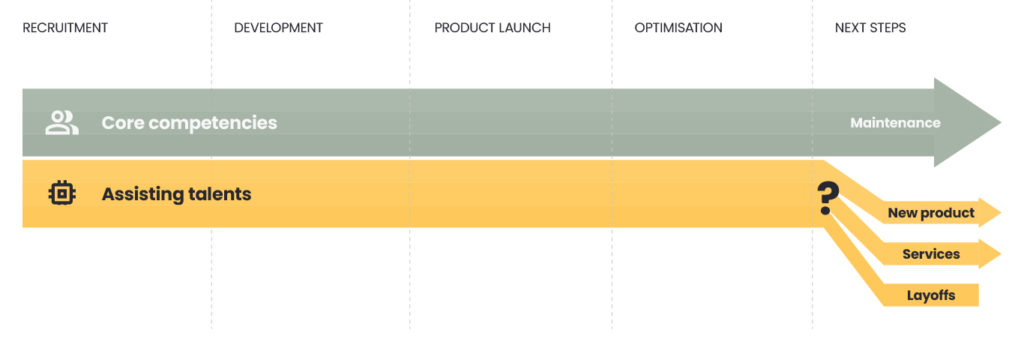Scaling robotics startups: answers to the most common challenges of growing companies
What problems do robotics startups face? Let us give the floor to Szymon Dzwonczyk, Director of Robotics at Spyrosoft, who knows the pain points of small technology companies first-hand. Running his startup for the past seven years and mentoring other founders, he now heads dozens of experienced roboticists and domain specialists to support companies even better. Let’s find out how Szymon orchestrates a team of experts to respond to the needs of growing robotics businesses.
The fundamental problem is the need for a wide-ranging expertise
Due to the complexity of robots, just to enter the market a startup must cover several areas, from hardware through back and frontend programming to cloud services and beyond.
Looking at a startup’s team, you can find people from every field but some of those non-core talents are needed rather temporarily. After the product launch, part of the team might be left without a project because, until a new product is built, what remains is maintenance. Companies that don’t want to let these specialists go, often transition from the product to service model, although this wasn’t their initial strategic plan.

My goal is to supplement startup teams with domain experts
But not all areas need to be covered internally. If a startup involves a company such as Spyrosoft early enough, some of these non-core areas in robotics can be addressed and appropriately scaled, while the key competencies remain within the company.
How can we support them?
- We are proficient in the field of robotics such as ROS, autonomy, or SLAM.
- We have expertise in cloud, embedded systems, human-machine interfaces, and other associated areas.
- Being a company with several business units, we have wide domain knowledge from automotive, healthcare, or geospatial fields, just to name a few. If our client develops a medical product, we can assist them when it comes to technology, but also in terms of regulations.
The model of cooperation I propose to such companies is usually to integrate someone from our team into theirs. If, for example, a startup needs support in introducing machine vision to their product, we set up a project that is a month or a few months long, employing one of our specialists in their team.
We can also quote the company for larger projects. Spyrosoft acts as a partner who will be in the background, so if the startup catches a big deal, we will join forces to handle the opportunity. With our resources, if their company grows, we can also expand the team in a practical way, indefinitely.
Every cooperation starts with understanding the startup’s needs
I, personally, always try to cut through as much bureaucracy and paperwork as possible and be on a similar communication level with the client.
We can process the cooperation with discovery workshops – a discussion and analysis where we look at what could be done for a client and how to arrange their plans into smaller steps. But if the client is already aware of gaps they need to fill, we can shorten or even skip this step, especially if they are pressed for time.
I ask company representatives about their strategic needs so I can arrange the next meeting directly with a specific specialist. The sooner the client starts talking with an engineer, the better. They can learn whether this person is the right fit for their needs, and, from the other side, if the engineer doesn’t perceive the project’s scope to be too little for an agreed period, or too wide.

Then, we move towards making an offer, negotiating rates, and determining how much time we allocate for the initial phase. We don’t jump straight into a year-long collaboration but start with a shorter period, like a month or three.
Obtaining all accesses, documentation or equipment is done before starting the billable project.
In this model, we’re talking about engaging a senior, principal, or lead-level engineer
There’s a difference between team extension for small and large companies. Instead of conducting recruitment by the client, I pick a person with an appropriate skillset, who is used to working with startups and experienced enough to notice if something in the project diverges. Delegating such a person to a project cuts off the need for a project manager in the process, shifting the focus on execution and operational efficiency.
Our specialist works with the startup’s team on a daily basis, and the communication is direct. The client handles the project management, team management, and methodology in which the project is led.
After the set period, we discuss what more can be done
We aim to extend the cooperation, but it depends on the client’s capabilities. We talk about where we could further assist the company’s growth. This partly relies on conversations with the client and partly on the programmer, as he or she knows both the startup’s needs and our capabilities and can locate some weaker areas we could strengthen. If we see, for example, that the company is not confident in the cloud area, instead of hiring an in-house specialist, we can propose our expert without a long-term commitment.
If the client has all needs covered and doesn’t require our support now, we carry out offboarding. We ensure that all elements – documentation, software, accesses – are handed back to the company, leaving no loose ends that could block someone.
We can agree on a number of working hours or on a fixed price cooperation model
The fee for a specialist’s work varies between $60 and $100 per hour, and we can negotiate the price given the needed skillset or length of the project.
I know that prolonging the project time scope is one of the most common concerns. Our people are experienced enough to validate at the beginning whether the needed work is feasible in the agreed period. If we see such a risk, we discuss with the client what can be done within their budget. Also, we have syncs along the way to monitor if everything is going to plan or to identify signals that something is going awry and react quickly.
The second option is the fixed price cooperation model. We can agree on a set price for a specific job, no matter how long the delivery would take. That cuts the risk of going beyond the budget.
Let’s talk how we can support the jumpstart of your company
If you would like to learn more about this collaborative model or are already seeing areas in your startup where we could support you, please contact Szymon via the form below or reach him on Linkedin.
About the author
Contact us
Let’s talk how we can support your startup growth
Our blog





![[bloghero-thumbnail] ros on nvidia jetson board](https://spyro-soft.com/wp-content/uploads/2023/07/bloghero-thumbnail-ros-on-nvidia-jetson-board.jpg)
